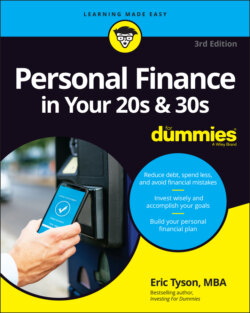Читать книгу Personal Finance in Your 20s & 30s For Dummies - Eric Tyson - Страница 9
ОглавлениеIntroduction
Your 20s and 30s are such an exciting time. During this period you’re experiencing some dramatic changes in your life, exploring new endeavors, making your way in the world, trying new things, and meeting new people, while hopefully staying in touch with old friends and your family.
But as with anything else in life, your young-adult years can pose challenges as well. Some young people suffered layoffs and reduced employment incomes during the 2008 financial crisis and its aftermath and then again with the 2020 COVID-19 pandemic. Maybe you’ve experienced a failed relationship and a broken heart. You’ve likely had to deal with a difficult boss (or two) or a job (or two) you don’t like — or perhaps you’re in danger of losing your job.
And then there are the money issues. Most of you are out of the nest and out from under your parents’ wings, and your 20s are when you experience firsthand earning your own money and paying your own expenses. This isn’t true for all twenty-somethings, of course, because some young people still live at home or have some financial dependence on their folks — maybe that’s why they bought you this book! No matter your living situation, your young adult years can be a challenging time, but this friendly guide can help make those years smoother and more rewarding financially.
About This Book
Based on my experiences teaching courses, counseling clients, writing articles and books, and corresponding with friends, family, and people through my website, I’ve discovered how important having healthy and strong personal finances is. With that in mind, I wrote this book to help you begin to lay a strong financial foundation. Your early adult years are the best time to start.
I’ve worked with and taught people from all financial situations, so I know the financial concerns and questions of real folks just like you. Believe it or not, I first became interested in money matters when, as a middle-school student, my father was laid off and received some retirement money. I worked with my dad as he made investing decisions with the money. A couple of years later, I won my high school’s science fair with a project on what influences the stock market.
In my 20s, I worked hard to keep my living expenses low and save money so I could leave my job and pursue my entrepreneurial ideas. I accomplished that goal in my late 20s. My goal in writing this book is to give you lots of tools and information to help you get your personal finances in order so you, too, can achieve your goals and dreams.
I also wrote this book to protect you, to watch your back. Hucksters out to separate you from your hard-earned money know an easy mark when they see one, and being young and, therefore, less experienced makes you a target. You’re also at increased risk of “being taken” because your generation spends so much time online where the rules and agenda of many sites and apps are murky or worse. The information and advice in this book can help you identify and steer around common pitfalls and bad deals before you suffer the consequences.
Foolish Assumptions
No matter what your current situation is — whether you’re entering the job market right after school, graduating college with or without student loans, living with your parents, or living on your own — I thought of you as I wrote this book. I made some assumptions about you:
You want expert advice about important financial topics — such as getting a financial checkup, budgeting, paying off some debt, boosting your credit score, and investing — and you want answers quickly.
Or perhaps you want a crash course in personal finance and are looking for a book you can read cover to cover to help solidify major financial concepts and get you thinking about your finances in a holistic fashion.
Or maybe you’re just tired of feeling financially frazzled and want to get better organized and on top of your money matters.
This book is basic enough to help a novice get his or her arms around thorny financial issues. But readers who are a bit more advanced in financial matters will be challenged, as well, to think about their finances in a new way and identify areas for improvement.
Icons Used in This Book
The icons in this book help you find information you need:
This target flags strategy recommendations for making the most of your money.
This icon points out information that you definitely want to remember.
This icon marks things to avoid and points out common mistakes people make when managing their finances.
This icon tells you when you should consider doing some additional research. Don’t worry — I explain what to look for and what to look out for.
Beyond the Book
To view this book’s Cheat Sheet, simply go to www.dummies.com and enter “Personal Finance in Your 20s and 30s For Dummies Cheat Sheet” in the Search box. There you’ll get quick tips on understanding financial basics, managing day-to-day finances, and growing your money through basic investing.
Where to Go from Here
This book is organized so you can go wherever you want to find complete information. Want advice on minimizing your taxes, for example? Go to Part 2 for that. You can use the table of contents to find broad categories of information or the index to look up more specific topics.
If you’re not sure where to go, you may want to start with Part 1. It gives you all the basic info you need to assess your financial situation and points to places where you can find more detailed information for improving it.
